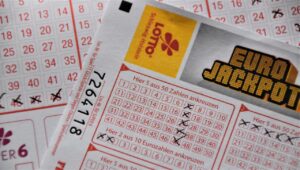The Futility of playing the lottery

INTRODUCTION
Is it possible to use a system to beat the odds and live a life of luxury? The lottery or lotto as it is called in New Zealand first began in 1987 and I have never heard of any lotto winner claiming to have found a system to beat the odds. Most have won using lucky dips or lucky numbers, others have just selected their own numbers.
The odds of winning the lottery
Lotto is played by millions of people worldwide in the hope of one day becoming lucky but for the vast majority of people that lucky lotto day never arrives. The huge odds against winning lotto ensures that millions contribute to the pool but only a few hit the jackpot.
In New Zealand a lotto player is require to select six drawn numbers out of forty. It is called division one. The odds of any one set of six numbers being the successful six are in in three million+
Power ball is when you have selected division one + the power ball number which is 1-10. The odds of winning power ball are so remote that one is more likely to be struck by lightning. It is not surprising that the power ball often jackpots to huge amounts.
Some mathematicians have described the lottery as a tax on stupidity.
At least 66% of New Zealanders play lotto at least once a year. I do not know how many of them play every single week.
People who would otherwise consider themselves intelligent fall for the enticing advertising in order to participate in a gamble that is unlikely to succeed. Rationality simply goes out of the window.
A song and dance is made about the fact that 20% of all lotto sales is donated to various charities.
What I have to say about that is the lottery sucks out more money from communities than it returns.
If one was simply donating to charities directly the person making the donation is able to claim 33% back in tax. (New Zealand). The advantage of donating to charity directly is one can choose who to give money to.
Lotto players will completely ignore all of the mathematical statistics with the argument, “You have got to be in to win.”
Problem with that kind of thinking is that few people ever do and often when they do win something, the payoff is usually one of the smaller prizes which is often spent on buying more lottery tickets or quickly frittered away in the blink of an eye.
ANNUAL LOTTERY SPENDING
If a lotto player spends $10 per week on the lottery that equates to $520 per annum. Think of what else that could have been invested in or put to better use.
There are so many share market trading platforms around today that the $10-$20 per week spent on lottery tickets could easily be used to start an investment portfolio.
Do the mathematics; $10 per week equates to $520 per annum. Over a lifetime this all adds up to a fortune.

LOTTERY SYSTEMS
Many people will swear by systems; whatever you are told the statistical odds of any set of six numbers being drawn are the same, however, if you choose numbers or a combination of numbers that are not chosen by other players then you will share the prize pool with fewer players if it is your lucky day. This is the type of strategy used by some system promoters.
Do not be deceived into thinking that any system will increase your chances of winning. This is not true!
As far as finances are concerned, I am saying that the money spent on lottery tickets is better directed at investments where you at least have something to show for it such as your retirement fund.
It should be kept in mind that the lotto millionaires are created only because millions of lotto players have lost. You don’t have to be one of them!
ABOUT THIS ARTICLE
You are welcome to use this article to post on your site, as content for your ebook, or share it on social media. Visit my site www.robertastewart.com for other articles on finance.
www.robertastewart.com


